

Jointly organised by the Singapore Police Force (SPF), Singapore Road Safety Council (SRSC), Land Transport Authority (LTA), Ministry of Education (MOE), People's Association (PA) and Automobile Association of Singapore (AAS), this year's campaign aims to motivate good safety behaviours across all road users with the theme "Road Safety for All".
Although the number of fatal accidents and road deaths fell to record lows since 1981, greater effort and strategy can be adopted towards reducing the accident rates of elderly pedestrians and motorcyclists.
By incorporating B.F. Skinner's operant conditioning, let us explore the various efforts that the Traffic Police can apply and undertake to promote road safety. Let's go!
Operant Conditioning - Reinforcement & Punishment. Operant Conditioning. Skinner - Operant Conditioning Operant conditioning, sometimes referred to as instrumental conditioning, is a method of learning that occurs through rewards and punishments for behavior.
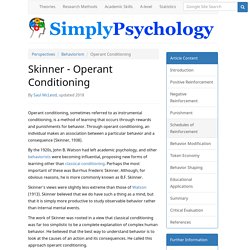
Through operant conditioning, an individual makes an association between a particular behavior and a consequence (Skinner, 1938). By the 1920s, John B. Watson had left academic psychology, and other behaviorists were becoming influential, proposing new forms of learning other than classical conditioning. Perhaps the most important of these was Burrhus Frederic Skinner. Skinner's views were slightly less extreme than those of Watson (1913). What Is Operant Conditioning and How Does It Work? Operant conditioning, sometimes referred to as instrumental conditioning, is a method of learning that employs rewards and punishments for behavior.
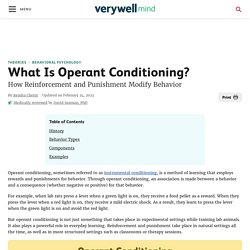
Through operant conditioning, an association is made between a behavior and a consequence (whether negative or positive) for that behavior.1 For example, when lab rats press a lever when a green light is on, they receive a food pellet as a reward. When they press the lever when a red light is on, they receive a mild electric shock. As a result, they learn to press the lever when the green light is on and avoid the red light. But operant conditioning is not just something that takes place in experimental settings while training lab animals.
The History of Operant Conditioning Operant conditioning was first described by behaviorist B.F. Through the first part of the 20th century, behaviorism became a major force within psychology. Early behaviorists focused their interests on associative learning. Types of Behaviors Reinforcement Schedules. Figure 1. Figure 2. Figure 3. Figure 4. Everything You Need to Know About No Claim Discount (NCD) in Singapore. If you own a vehicle in Singapore, you’ll definitely have motor insurance coverage, and you’ve probably heard of the No Claim Discount (NCD).
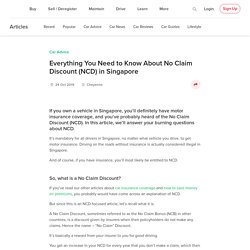
In this article, we’ll answer your burning questions about NCD. It’s mandatory for all drivers in Singapore, no matter what vehicle you drive, to get motor insurance. Driving on the roads without insurance is actually considered illegal in Singapore. And of course, if you have insurance, you’ll most likely be entitled to NCD. So, what is a No Claim Discount? If you’ve read our other articles about car insurance coverage and how to save money on premiums, you probably would have come across an explanation of NCD.
But since this is an NCD-focused article, let’s recall what it is. A No Claim Discount, sometimes referred to as the No Claim Bonus (NCB) in other countries, is a discount given by insurers when their policyholders do not make any claims. It’s basically a reward from your insurer to you for good driving. Figure 5. Demerit Free Driver Decal. Positive Reinforcements. Traffic Matters. In Singapore, you need to possess a valid Singapore Driving Licence to drive or ride a motor vehicle on our roads.
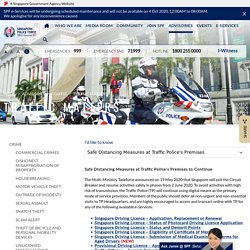
The driving licence will indicate which class of vehicle you are able to drive or ride. This applies to: ComfortDelGro Driving Centre - Safe Driving Course - Traffic Police. The Safe Driving Course is introduced under Driver Improvement Points System (DIPS) as a ‘circuit breaker’ for motorists who are close to being liable for their first suspension under DIPS.
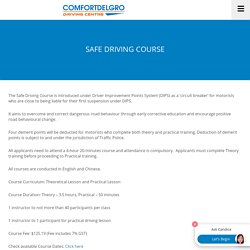
It aims to overcome and correct dangerous road behaviour through early corrective education and encourage positive road behavioural change. Four demerit points will be deducted for motorists who complete both theory and practical training. Deduction of demerit points is subject to and under the jurisdiction of Traffic Police. All applicants need to attend a 4-hour 20-minutes course and attendance is compulsory. Applicants must complete Theory training before proceeding to Practical training. All courses are conducted in English and Chinese. Negative Reinforcements. Traffic fines in Singapore (2020) - guide to LTA, URA, HDB, TP and ERP fines, Lifestyle News. When you own a car, traffic wardens are your worst enemy and roadblocks send shivers down your spine - after all, there's nothing worse than getting traffic fines in Singapore.
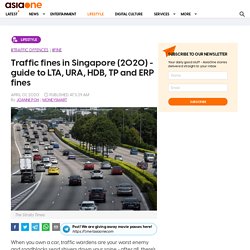
As if it's not enough that the cost of your car and COE would be enough for you to retire in a neighbouring country, there's also quite a number of traffic fines you could potentially be slapped with. Positive Punishment. Charged with a Traffic Offence in Singapore: What to Do. The number of traffic offences committed in Singapore have been constantly high.
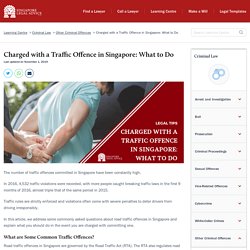
In 2016, 4,532 traffic violations were recorded, with more people caught breaking traffic laws in the first 9 months of 2016, almost triple that of the same period in 2015. Traffic rules are strictly enforced and violations often come with severe penalties to deter drivers from driving irresponsibly. Negative Punishment.